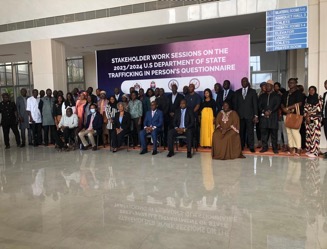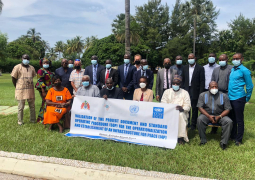
The event, which attracted state and non-state actors, seeks to develop comprehensive and informed recommendations, policies and practices that will guide the global response to human trafficking. The 2023 TIP report highlights the importance of strategic partnership, sharing of best practices and international cooperation in combating this heinous crime.
Welcoming the gathering, Isatou Dabo, executive director of National Agency Against Trafficking In Persons, acknowledged that as customary, that was the time the country recorded its anti-trafficking activities over a stipulated assessment period.
“Data is recorded together with various intervention under the 4P approaches of Prevention, Protection, Prosecution and Partnership. At the heart of our response to the TIP questionnaire lies a commitment to the core principle that define our humanity: the protection of human rights and the preservation of human dignity. Human trafficking is an afront to this principle, reducing individuals to the commodities and stripping away their inherent worth.”
ED Dabo reminded that a comprehensive response serves as bastion against this assault on human dignity, pointing out that it reaffirms their dedication to ensuring that every person regardless of circumstances, is entitled to the spectrum of rights and freedoms.
She noted that the forum is testament to their belief in the sanctity of life and the inherent value of every individual, adding that in championing human rights, they do not only uplift the victims of trafficking, but also contribute to global narrative that celebrates the intrinsic worth of every human being.
Also speaking, Desta Tiruneh, United Nations Resident Coordinator acknowledged that despite the existence of comprehensive international legal frameworks, millions of people continue to be trafficked every year.
He observed that like many countries, the Gambia is not immune to this growing scourge, as the clandestine nature of trafficking makes it difficult to quantify the phenomenon.
However, he said the Gambia is known to be a source, transit and destination country for human trafficking, with sexual exploitation and forced labour being the most common.
For her part, Sharon Cromer, Ambassador U.S. Embassy, expressed appreciation to NAATIP and the relentless strides they've made in combating trafficking within The Gambia.
Ambassador Cromer reminded that with the unwavering support from the United States’ Department of State Office to Monitor and Combat Trafficking in Persons (J/TIP), and in close collaboration with NAATIP under the Ministry of Justice, the International Organization for Migration (IOM) spearheaded a project entitled – ‘Supporting National Efforts to Combat Human Trafficking.’
That project, she added, operated on the foundation of the ‘4Ps’ approach that is - Protection, Prevention, Prosecution, and Partnerships.
“Through the unwavering dedication of both local and international stakeholders, this initiative yielded remarkable outcomes.”
For his part, Dawda Jallow, attorney general and Minister for Justice, expressed gratitude to be associated with the event saying we are confronted with the ethical imperative of combating human trafficking; a dark reality eroding society.
The annual Trafficking-In Persons Report is not just paperwork, but something that mirrors ‘our commitment to justice and humanity.’
The annual US Department of State Trafficking-In Persons Report, he added, is of a great importance, recalling that over the last two assessment periods, The Gambia has consistently held a Tier 2 ranking.
“Like I told the ambassador, we are working towards Tier 1 ranking and that is our target. The questionnaire distributed to 188 countries serves as canvass on which we articulate our nation’s commitment against the violations of human dignity.”
Minister Jallow revealed that within its pages, they expressed dedication to breaking the case that entrench the vulnerable, pointing out that ‘our response is not bureaucracy but a moral obligation affirming their stance against exploitation.’



